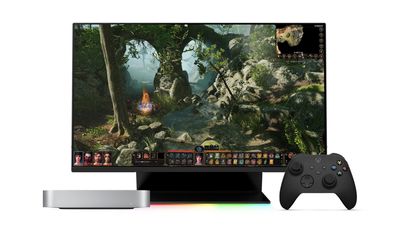macOS Monterey to Offer Smoother Gameplay With Support for Adaptive-Sync Displays on Newer Macs
As part of WWDC this week, Apple revealed that newer Macs will be gaining support for Adaptive-Sync external displays with variable refresh rates in macOS Monterey.

Apple says Adaptive-Sync displays will be supported on any Mac with Apple silicon, like the M1 chip, as well as "many" recent Intel-based Macs. When a supported Adaptive-Sync display is connected to a compatible Mac, users will be able to enable Adaptive-Sync mode by selecting a new variable refresh rate option in System Preferences > Displays.
Adaptive-Sync is a feature of the DisplayPort 1.2a specification, and it serves as the foundation of popular variable refresh rate display technologies like AMD FreeSync and Nvidia G-Sync, which will now be supported on newer Macs.
Macs gaining support for Adaptive-Sync displays will be particularly beneficial to gamers, as these displays can actively adjust their refresh rate to match a game's frame rate, providing smoother, lower-latency gameplay. Apps or games must be running in full-screen mode on macOS Monterey for Adaptive-Sync mode to function, according to Apple.
macOS Monterey is available now in beta for developers, with a public beta to follow in July. The software update will be released in the fall.
Popular Stories
Despite being more than two years old, Apple's AirPods Pro 2 still dominate the premium wireless‑earbud space, thanks to a potent mix of top‑tier audio, class‑leading noise cancellation, and Apple's habit of delivering major new features through software updates. With AirPods Pro 3 widely expected to arrive in 2025, prospective buyers now face a familiar dilemma: snap up the proven...
If you have been experiencing issues with wireless CarPlay in your vehicle lately, it was likely due to a software bug that has now been fixed.
Apple released iOS 18.4.1 today, and the update's release notes say it "addresses a rare issue that prevents wireless CarPlay connection in certain vehicles."
If wireless CarPlay was acting up for you, updating your iPhone to iOS 18.4.1 should...
Apple's iPhone development roadmap runs several years into the future and the company is continually working with suppliers on several successive iPhone models simultaneously, which is why we often get rumored features months ahead of launch. The iPhone 17 series is no different, and we already have a good idea of what to expect from Apple's 2025 smartphone lineup.
If you skipped the iPhone...
Apple is preparing a "bold" new iPhone Pro model for the iPhone's 20th anniversary in 2027, according to Bloomberg's Mark Gurman. As part of what's being described as a "major shake-up," Apple is said to be developing a design that makes more extensive use of glass – and this could point directly to the display itself.
Here's the case for Apple releasing a truly all-screen iPhone with no...
While the iPhone 17 Pro and iPhone 17 Pro Max are not expected to launch until September, there are already plenty of rumors about the devices.
Subscribe to the MacRumors YouTube channel for more videos.
Below, we recap key changes rumored for the iPhone 17 Pro models as of April 2025:
Aluminum frame: iPhone 17 Pro models are rumored to have an aluminum frame, whereas the iPhone 15 Pro and ...
The first iOS 19 beta is less than two months away, and there are already a handful of new features that are expected with the update.
Apple should release the first iOS 19 beta to developers immediately following the WWDC 2025 keynote, which is scheduled for Monday, June 9. Following beta testing, the update should be released to the general public in September.
Below, we recap the key...
This week saw rumor updates on the iPhone 17 Pro and next-generation Vision Pro, while a minor iOS 18.4.1 update delivered not just security fixes but also a fix for some CarPlay issues.
We also looked ahead at what else is in Apple's pipeline for the rest of 2025 and even the 20th-anniversary iPhone coming in 2027, so read on below for all the details on these stories and more!
iPhone 17 ...
Apple TV+ is currently available at a much lower price than usual, but time is running out if you want to take advantage of the offer.
In the U.S., new and qualified returning customers can subscribe to Apple TV+ for just $2.99 per month, for three months. Afterwards, regular pricing of $9.99 per month applies. The offer is available in the Apple TV app, and at tv.apple.com, through April...























